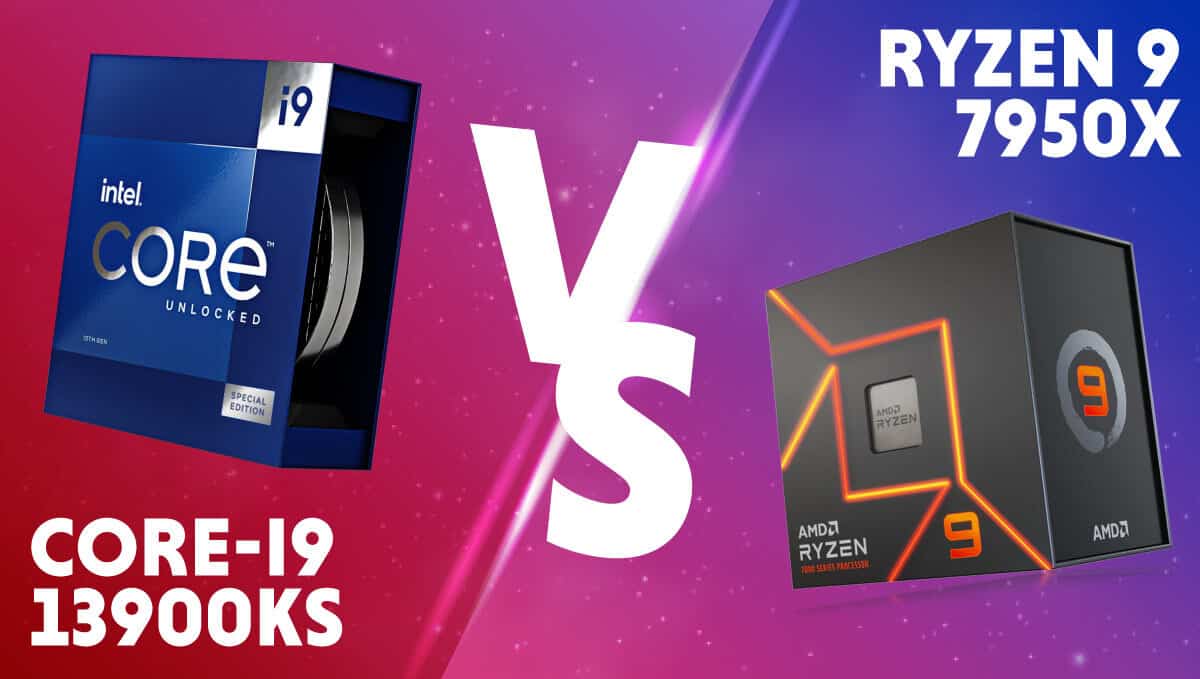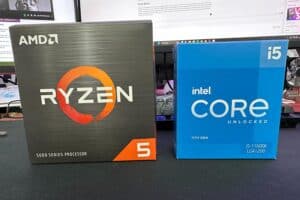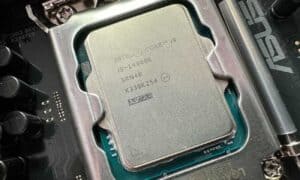Intel Core i9-13900KS vs Ryzen 9 7950X
Which is better? the best of team Blue, or team Red?

WePC is reader-supported. When you buy through links on our site, we may earn an affiliate commission. Prices subject to change. Learn more
Intel has gone above and beyond with the 13th generation of CPUs, bringing incredible power to the hands of gamers for a reasonable price. Recently, the team over at Intel decided what we have isn’t enough and released the 13900KS, a monster 6GHz CPU. But which flagship is better? This is Intel Core i9-13900KS vs Ryzen 9 7950X.
Now read: Best CPU cooler for Core i9-13900KS
The 13900KS promises to bring performance as we’ve never seen before, it was actually “teased” way back when Intel unveiled the 13-the-generation CPUs. That’s all well and good, but how does it actually stack up against the competition? Spoiler alert; very well.
Without further delay, let us dive into the specifications of the two CPUs we have in the arena today.
Intel Core i9-13900KS vs Ryzen 9 7950X: Specifications
Here we will outline the specifications of both CPUs, for comparative purposes, and then discuss the differences between them.
Core i9-13900KS
- Cores: P-cores 8 / E-cores 16
- Threads: 32
- Base clock frequency: P-cores 3.2 GHz / E-cores 2.2 GHz
- Boost clock frequency: P-cores 6 GHz / E-cores 4.3 GHz
- L3 cache: 36MB
- Default TDP: 125 W / 253 W boost.
- iGPU: Intel UHD graphics 770
The 13900KS is an impressive beast, with clocks reaching 6GHz when boosting and managing with a TDP no higher than the base 13900k. Intel has exceeded all expectations with this CPU.
Ryzen 9 7950X
- Cores: 16
- Threads: 32
- Base clock frequency: 4.5 GHz
- Boost clock frequency: 5.7 GHz
- L3 cache: 80MB
- TDP: 170W
- iGPU: RDNA 2
The Ryzen 9 7950X is the flagship Zen 4 CPU and promises to lead the charge on AMD’s domination of multi-core performance, but will it be enough to stave off Intel?
Intel Core i9-13900KS vs Ryzen 9 7950X: Specification comparison
For the sake of time, we’re only going to analyze the difference between the two CPUs. We assume you know how a CPU works in even a basic sense and can appreciate how important some of these metrics are. If not, don’t worry, we’ll explain.
Split core technology
Intel introduced the “LITTLE.big” core architecture in its 12th-generation Intel processors, this architecture persists in the 13th generation, and in the 13900KS.
There isn’t just one type of CPU core in the 13900KS, like in the Ryzen, there are two. Divided into E-cores and P-cores, this system is devised to make intel CPUs more efficient.
What happens is that a task is generated by a program or process and it is pre-screened and delegated to either a P-core or an E-core, depending on the resources that the task demands. This is done by the task scheduler. It helps to keep efficiency up by assigning lesser demanding tasks to the slower, more efficient E-cores, instead of using the beefy P-cores needlessly.
Inside the Ryzen CPUs, it’s just one good old CPU core throughout. No split cores here just yet.
Core speed
Core speed can be split into two categories, base speed, and boost speed. We’ll inform you love the difference below.
CPU core base speed
The CPU core base speed is the speed at which the CPU cores operate at, or as close to, 0% load. This is where a CPU’s efficiency stems from. The lower the core speed, the less power you use. This is why the 13900KS is packed with efficiency cores that run at low speeds constantly. The 7950X does not have this luxury.
CPU core boost speed
This is the opposite of the base speed, CPU core boost speed is the speed at which CPU cores operate when boosting, or at, or close to 100% load. This is the power-hungry side of the CPU, the higher the boost speed, the more power is consumed.
Core speed is felt much more at the top end of the scale, as CPUs rely on fast cores to get the processing done quickly. Unfortunately, it’s not like base speed where you can afford to lose a couple of hundred MHz off your speed.
So it’s a pretty good bet that the CPU with the higher boost speed is going to perform the best. That just happens to be the 13900KS
TDP
The TDP for both CPUs is pretty high, but thanks to the efficiency cores in the 13900KS, it squeaks ahead of the 7950X.
TDP stands for Thermal Design Power and it’s the maximum amount of thermal energy a component can output, under normal operating conditions.
A lower TDP means you can potentially save money, save money on running the CPU, purchasing the CPU, and cooling the CPU, as a lower TDP means a less intense cooling solution. However, both of our CPUs are pretty evenly matched here, so it’s hard to say exactly how much difference there would be in terms of running costs.
Intel Core i9-13900KS vs Ryzen 9 7950X: Price
Hold on to your wallets folks, this one’s gonna be expensive.
Both CPUs are pretty pricey, but the 13900KS takes the cake here. It might just be the most expensive CPU we have seen that isn’t a Threadripper or an EPYC.
Here’s the MSRP of the two CPUs side-by-side:
- Core i9-13900KS: $725 (unconfirmed)
- Ryzen 9 7950X: $699
As you can see, the 13900KS might be better, but it doesn’t come cheap.
Final word
The 13900KS is a clear winner here, the superior performance is something that we can’t ignore. It does do slightly better in terms of efficiency too. Not to mention the fact that Intel offers DDR4 motherboards to help ease the cost of upgrading, and that’s something that AMD does not offer.
It’s a big upgrade cost no matter who you go with. But Intel has at least tried to facilitate and make it a little easier on the wallet for gamers to upgrade. And we commend Intel highly for that.




